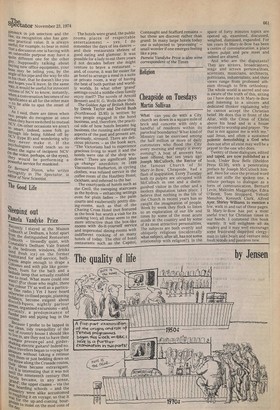The Good Life
%ening out
Pamela Vandyke Price Recently I stayed at the Maison Tolbooth at Dedham, a hotel apart .7,Tht the distinguished Restaurant olbnoth — blessedly quiet, with 47)astable's Dedham Vale framed al the bedroom windows, drinks (arid fresh ice) on the former ashstand for' self-service, bath,L°Wels ample enough to drape a .`4-olossus and with pile like goose
', foam foam for the bath and a
side lamp that actually enabled one to read. What more could one 1.W4t1t? (For those who might, there i-ras colour TV as well as a particu,,,.ar, fine radio.) Yet I have heard civilised people, planning drItlaYs, become exigent about Ascoth ques, nightly parlour eg:thes, organised excursions — and, flartilinlY, a predominance of .tho pan and piping bag in the oaisine. thbecause I prefer to be lapped in clean, tidy tranquillity of the (07. of country house I should like sc,„`Ive in, are they not to have their sh—T1,Pis proven ca/ and, girderond'alg electric guitars? Indeed no. PI ce travellers began to voyage for 1,Zakstire without taking a retinue em or just bedding down on t;:e.straw along the Crusade routes, N',,teh; ideas became extravagant. uet it is interesting that it was not iirthl the nineteenth century that '°tels became, in any sense, hest the upper classes — via the pe the schools — and the to ai.a,.,EthtrY were alike accustomed w;,„"hghing it en voyage, so that it
P the u -and-coming bour
geois; th 'e to insist on the mod cons of e day. i
The hotels were grand, the public rooms places of respectable entertainment — yes, I do remember the days of tea dances — and their restaurants shrines of good eating and glamour. It was possible for a lady to eat there years if not decades before she might venture to brave a restaurant — and, of course, it was far easier for an hotel to arrange a meal in a suite or private room, a way of having the best of both puritan and worldly worlds. In what other 'grand' settings could a middle-class family enjoy itself? The novels of Arnold Bennett and H. G. Wells show this.
The Golden Age of British Hotels by Derek Taylor and David Bush (Northwood £5.95) is written by two people engaged in the hotel business, and, therefore, the practical side of how hotels became big business, the running and catering aspects of the past and present are, obviously, stressed. There are delicious pictures — as the book says, "The Victorians had to experience gracious living to want it and the hotels were one of the shop windows." There are significant 'plus ca change' anecdotes: in 1899 Viscountess Harburton, in cycling clothes, was refused service in the coffee room of the Hautboy Hotel, Ockham, and referred to the bar.
The courtyards of hotels such as the Cecil, the sweeping staircases in the hydros — enhancing settings even for plain ladies — the palm courts and exuberantly pretty dining-rooms, such as that of the Charing Cross Hotel (not featured in the book but worth a visit for its cooking too), all these seem to me more attractive than the box-like rooms with do-it-yourself service and impersonal dining-rooms with indifferent cooking of so many hotels of today. The chic of hotel restaurants such as the Capitol, Connaught and Stafford remains — but these are discreet rather than grand. In many large hotels today one is subjected to 'processing' — small wonder if one emerges feeling like a pea.
Pamela Vandyke Price is also wine correspondent of the Times


































 Previous page
Previous page